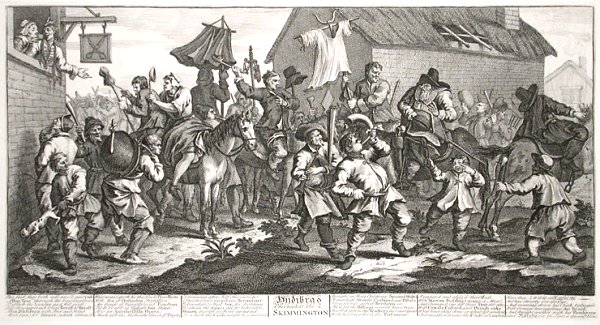Riding the Stang
Riding the stang
An English folk custom performed in Yeovil
The widespread English folk custom known as 'Riding the Stang' (also known as charivari or skimmington), is recorded in England as far back as early medieval times and at least one occurrence was recorded in Yeovil, in 1607. The term is particularly associated with the West Country.
Sometimes the participants would "ride the stang" - a pole carried between the shoulders of two or more men or youths - while banging an old kettle or pan with a stick and reciting a rhyme called a "nominy".
Usually, however, the skimmington or skimmington ride was a little more aggressive and the community gave a noisy, discordant mock serenade, frequently with pounding on pots and pans, also known as rough music, to make a public demonstration of moral disapproval of the individual or individuals. The loud, public ritual evolved to a form of social coercion, for instance, to force an as-yet-unmarried couple to wed. This type of social custom arose independently in many rural village societies across Europe.
Noisy, masked processions were often held outside the home of the supposed wrongdoer, involving the cacophonous rattling of bones and cleavers, the ringing of bells, hooting, blowing bull's horns, the banging of frying pans, saucepans, kettles, or other kitchen or barn implements with the intention of creating long-lasting embarrassment to the alleged perpetrator. During a rough music performance, the victim could be displayed upon a pole or donkey (in person or as an effigy), their 'crimes' becoming the subject of mime, theatrical performances or recitatives, along with a litany of obscenities and insults.
In Yeovil's recorded case of 1607 the participants were the two Churchwardens, Thomas Marsh and Roger Traske who apparently willingly 'rode the stang' during a particularly raucous Church Ale celebration and ended up in front of the magistrates. The Quarter Session records, in "Articles against Thomas Marsh and Roger Traske wardens at Yevel", recorded "Some of the disorders at our Church ale at Yeavell this year 1607. It was an usual thing upon the saboth day to have minstrelsie and dauncinge and carrying men upon a cavell staffe, the wardinges themselves Thomas Marshes and Roger Traske wear willingly so caried to the church." "Witness: Thomas Braine, Thomas Jarves, etc."
The 'cavell staffe' referred to above was a pole used for transporting a water vessel and carried on the shoulders of two carriers.
As a sidenote, tuneless, cacophonous 'rough music', played on horns, bugles, whistles, tin trays and frying pans, was a feature of the custom known as "Teddy Rowe's Band". This had taken place annually, possibly for several centuries, in the early hours of the morning, to herald the arrival of Pack Monday Fair at nearby Sherborne, Dorset, until it was banned by the police in 1964 because of hooliganism the previous year.
gallery

The Skimmington Ride, also known as 'Riding the Stang', in a 16th century plaster bas-relief from nearby Montacute House.

William Hogarth's engraving "Hudibras Encounters the Skimmington". 1727.